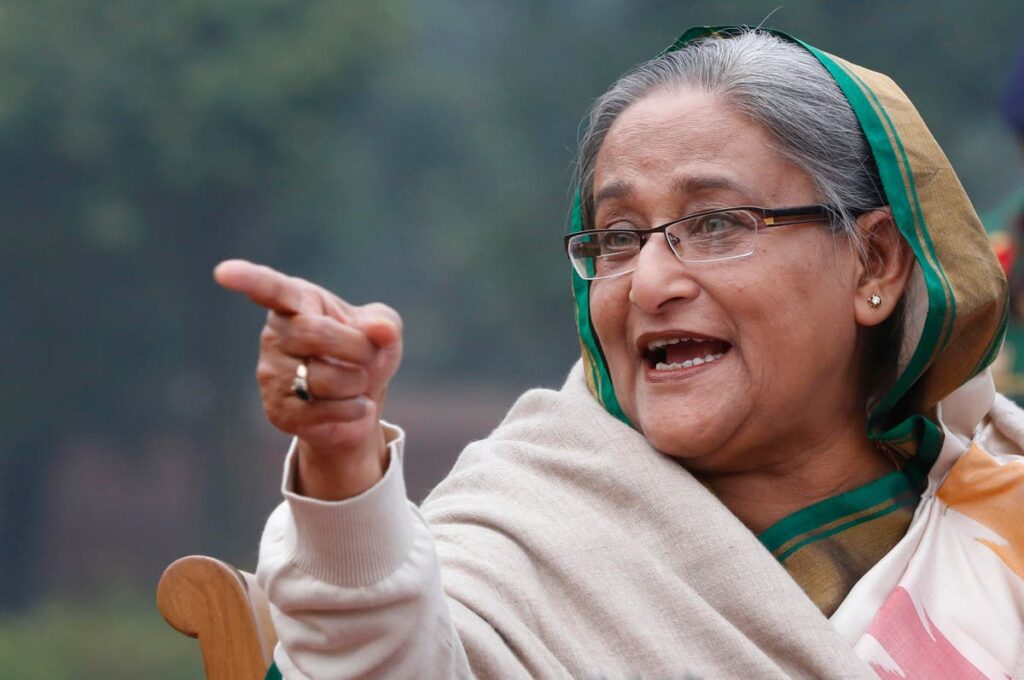Your support helps us to tell the story
As your White House correspondent, I ask the tough questions and seek the answers that matter.
Your support enables me to be in the room, pressing for transparency and accountability. Without your contributions, we wouldn’t have the resources to challenge those in power.
Your donation makes it possible for us to keep doing this important work, keeping you informed every step of the way to the November election


Andrew Feinberg
White House Correspondent
Thousands of students and others on Thursday rallied in Bangladesh’s capital to mark one month since former Prime Minister Sheikh Hasina was ousted from power by a mass uprising initially led by students over a quota system for government jobs.
Hasina fled to India on Aug. 5 after weeks of violence left more than 600 people dead, including students. The uprising ended the 15-year-rule of the country’s longest-serving prime minister who began a fourth consecutive term in January following an election boycotted by the major opposition parties, who questioned the credibility of the electoral process.
The demonstrators chanted slogans such as “Where is Hasina? Bury her, bury her!” and “Hasina-Modi, warning, be careful!” or “Naraye Takbeer, Allahu Akbar.”
They were referring Narendra Modi, India’s prime minister, as Hasina is known to be a trusted ally of India. Many protesters do not like India for promoting Hinduism and demonstrating what they see as a big brotherly dominance, and condemned it for sheltering Hasina.
The central procession, styled as a “shaheedi march” or “procession for the martyrs” began from the Dhaka University campus and marched through streets. In addition to the many Bangladeshi flags, some participants carried a giant Palestinian flag.
Tens of thousands joined rallies across the Muslim-majority nation of 170 million people.
In Dhaka’s Uttara neighborhood, thousands of school and madrasah students in uniform took part in processions, chanting anti-Hasina slogans. Some carried banners and placards, reading “We want Hasina’s execution” and “We want reforms of the state.”
Thursday’s development came as Bangladesh was returning to normalcy after the protests, despite challenges such as a struggling economy. An interim government led by Nobel laureate Muhammad Yunus, who had a frosty relationship with Hasina for many years, has prioritized law and order to stabilize the country.
Yunus in an interview with the Press Trust of India, or PTI, news agency released Thursday said that Hasina should stay quiet, and that her political remarks from India are an “unfriendly gesture.”
The protesters and other opponents of Hasina want her and her associates to stand trial for mass killings during the demonstrations that began in July.
“If India wants to keep her until the time Bangladesh wants her back, the condition would be that she has to keep quiet,” the PTI quoted Yunus as saying.
“No one is comfortable with her stance there in India because we want her back to try her. She is there in India and at times she is talking, which is problematic … No one likes it,” he said.
Yunus was apparently referring to Hasina’s statement on August 13 in which she demanded “justice”, saying those involved in recent “terror acts”, killings and vandalism must be investigated, identified and punished.
Yunus’ administration is reorganizing police, bureaucracy and other state institutions to take control amid reports of violence and continuing unrest.
Days of street protests by garment workers and other industries forced owners to shut their factories for days before they restarted their operations on Thursday amid heightened security in two major industrial hubs outside Dhaka.
Also, media reports said that a young Hindu man was beaten on Wednesday by a Muslim mob in the presence of security officials in the southwestern Khulna region after he allegedly posted derogatory comments online about the Prophet Muhammad.
The country’s two leading Bengali-language dailies, Prothom Alo and Samakal, reported online that the man, named as Sri Utso, was lynched by the mob, but they later removed the stories from their websites and republished new versions, saying that he did not die and was now receiving medical treatment. The reports provided no further details about the whereabouts of the 22-year-old man.
The military’s Inter Service Public Relations office in a statement later Thursday said that the soldiers rescued Utso after an angry mob attacked him inside the office of a senior police official. It said he survived and was out of danger, and he would be handed over to police for legal actions against him.
Yunus in the interview with the PTI refuted earlier reports that the Hindu minority had been targeted since Hasina’s fall. Modi had also earlier voiced concern over the reports of attacks on Hindus.
Yunus said the issue of attacks on minority Hindus in Bangladesh is “exaggerated” and questioned the manner in which India projected it.
He said the attacks on minorities in Bangladesh are more political than communal: he described them as the fallout of political upheaval as there is a perception that most Hindus supported the now-deposed Awami League regime of Sheikh Hasina.

